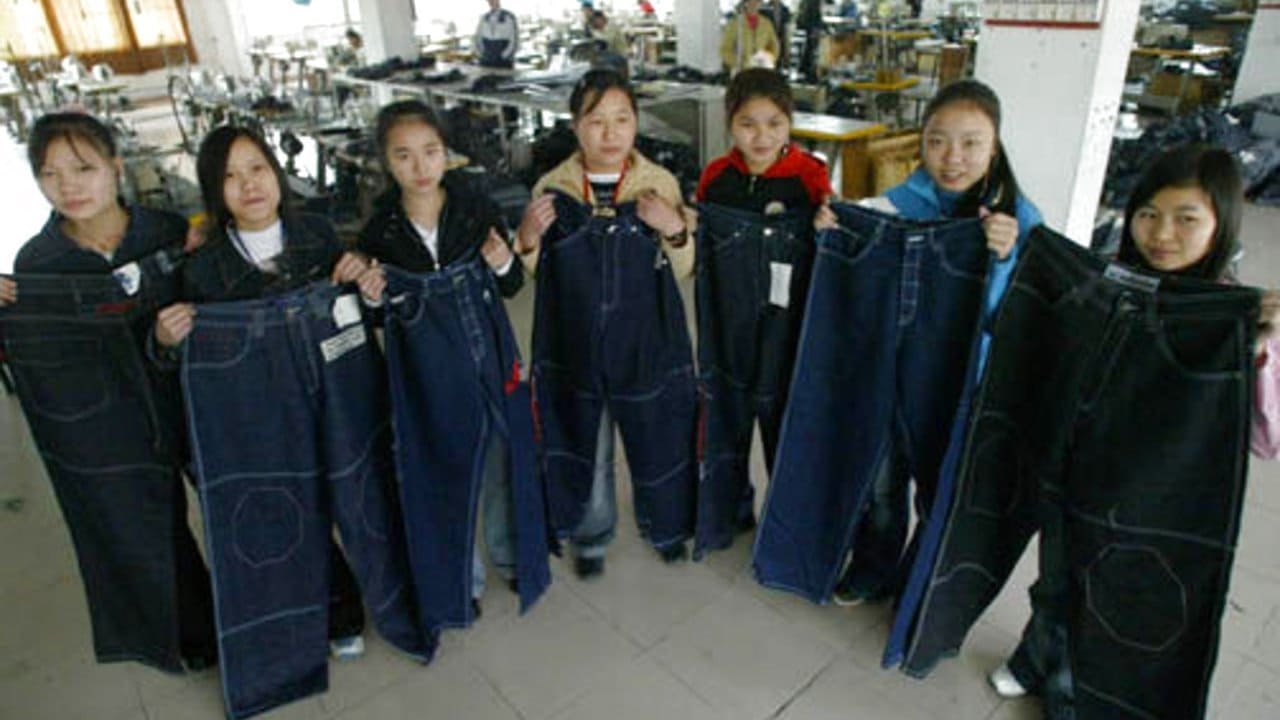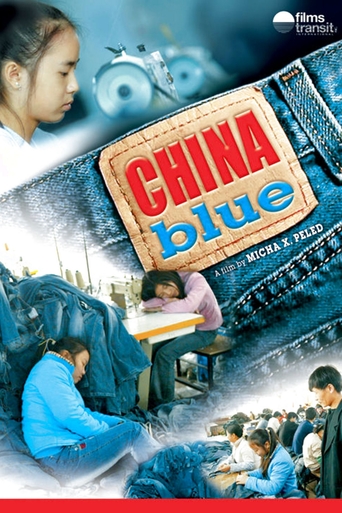

The film China Blue is a pleasant surprise, and a masterpiece. I hesitated to buy the DVD, since I dislike the idea of an American film about Chinese living conditions. However, the creator Micha X. Peled has done an excellent job and placed himself into the Joris Ivens school of documentary production, together with illustrious colleagues like Barbara Kopple. In fact Joris Ivens himself had a crush for Asia, and made early documentaries about labor conditions in Vietnam and China. The film China Blue describes the labor conditions in the Chinese jeans factory Lifeng (hence its name). The working conditions are poor, and comparable to the life of western industries in the immediate postwar period (the resemblance with the fictional films Norma Rae or Raices de Sangre is striking). This raises the obvious question why the CEO mister Lam allowed the film production. Mr. Lam is a former chief of police, and so we may assume that he dislikes the violation of rules in general, and of labor contracts in particular. However, since the competition is extremely fierce, and the western buyers tend to exploit the situation, the Chinese management has no other choice than to pass the exploitation to their personnel. So I guess that China Blue is actually the silent protest of mister Lam. It seems that the hindrance experienced by Peled came especially from government officials. The main characters are the twelve seamstresses, in their early teens, who share a dormitory in the factory. We follow their daily lives, and although there must have been some acting, it all looks authentic. There is the love story of Orchid, the poetry of Yasmin, dancing, evenings out and shopping. Basically they lead the lives that we know from our parents and grandparents. The industry aims at mass production, with long and boring working days (in Raices de Sangre a seamstress stitches her finger, indicating that the profession has some risks). The seamstresses originate from the countryside, and lack the experience with the industrial discipline and time schedules. In addition they suffer from the separation from their families, and the end of childhood. Errors are disciplined by means of wage fines, an antiquated system, although in the case of youths it may be difficult to think of an alternative. The labor conditions are worsened by the trucking system, due to in-house meals and accommodation. The accommodation brings back reminiscences of youth hostels and military service, without room for privacy (although privacy may not yet be the primary need for teenagers). In fact these images give the film multiple layers, since it shows how capitalism breeds socialism. The industrial mass production implies the accumulation and equation of their workers. In this sense the film is more an accusation against the western buyer-ups and his consumers, than an attack on Chinese working conditions. In the Netherlands the film has even been used on educational projects for fair trade. Actually the impression of the film was so strong, that during the following night in a dream I found myself working in the factory. One of my colleagues made a clandestine use of my electric shaver, without cleaning it afterwards. Here is the dilemma of socialism for you. On the other hand, capitalism is notorious for environmental pollution etc. Perhaps it is all a question of living together. In conclusion I prefer China Blue over more illustrious Chinese films like To Live or Still Life, and give it a warm recommendation. If you like films like these (Kopple, Ivens, and realistic fiction), you might consider seeing my other reviews.
... View MoreChina Blue brings us what a powerhouse reality is all about. Think about the jeans you are wearing and how much effort, sweat and lack of sleep went into making it. How many times have you thought about that? So for people who say that they will not buy Chinese made Jeans as this industry weakens American made Jeans (if any left) or exploits people then think about the benefits (as little as they may be) the people that put effort into making this Jeans get. What can we say? this is the world that we are living at regardless of which country it is. It is the nature of growing economies - people have to make choices and sometimes do not have choices to make, are being exploited, working around the clock so the future generations will fair better. Sounds familiar? This is where our grand-parents and sometimes great-uncles and aunties had to go through to get us the kind of life we now take for granted in the western society will live in.Micha Peled manages to convey the story about the people behind this economic power in a fascinating way. It is told mostly from the view point of a girl, 16 years old factory worker Jasmine. But from my point of view, everyone, even the factory manager gets to be humane. On one hand the tension the managers go through of whether they'll succeed in delivering the goods and the impact it has on all the workers, and on the other hand the grim sacrifice Jasmine had to make in order for her sister to get a better education, one which has been denied from her. We witness that similar sacrifices by most of the workers.However, this is the price of modernity and in essence it can not be avoided. After all, quite a few factories in China went bankrupt as they were not able to compete. But, like Nike sweatshops in Indonesia we have to voice our concerns about the working conditions of the people who make the products we consume. Not to stop this powerhouse but to provide the right support for workers rights. After all, without these kind of jobs they would fair much worse.Anecdote - the girl's goldfish that "can choose when to sleep", unlike the girl. The goldfish is a symbol of prosperity (in the ancient times common people were not allowed to own it).Watched the movie on Australia's SBS.
... View MoreI watched China Blue with mixed emotions of anger,sadness,despair and even some guilt.Its a film that every Western consumer must see.Its gives a great insight into the sweatshops and the harsh lives of the young sweatshops workers that make our goods.Some of the workers(or slaves)would be classed as children in our society.It's a hard piece of viewing but I think it must be viewed by anyone that wears clothes.I couldn't get Little Jasmine(the main focus of the film)out of my head for days after viewing.She and her co-workers work around the clock to meet deadlines for Western company's and often don't get paid.They are treated like trash by management and often made wear pegs on there eyes to keep them awake.It brings home the point of capitalism's over production in one part of our world and extreme poverty in the other.The film makers done an excellent job in exposing this kind of human cruelty.
... View MoreChina Blue is one of the most interesting, intelligent documentaries I've ever seen. It sets itself apart from other documentaries in how closely attached we become to the workers the filmmakers chose to concentrate on in the film. We get to see away from the factory floor and even to the countryside where they immigrated from. I've spent hours speaking with assistant producer Song Chen, the Taiwanese-American who speaks Chinese and who did so much of the work to gain the impossible access to the factory workers, even filming in their dorm rooms. This film would have only taken 2 to 3 years to film IF one of the two main people in the factory didn't quit and disappear. An incredible tragedy on the surface, in fact, to all of those who fell in love with the new worker, the delay and re-filming was one of the things that allowed the director and Song go far more deeply into the reality of the situation than they normally would have been able to. I don't know how engaging the original girl would have been, but the two girls who ended up taking part in the filming (and who were NOT paid, but told to cooperate by the factory owner, who thought the movie was being made about HIM) were simply wonderful. Part of what makes the film fascinating was how things 'accidentally' worked out in the favor of the documentary. The factory putting off paying them until they called a mini- protest/revolt and won... all caught on film by chance... The unbelievers would have you believe that the workers might not have behaved that way if there wasn't a camera. The workers thought the camera was off. Song was shooting that scene, put the camera down to her side, and purposely failed to turn the camera off. That was one of the greatest moments in the film. That and the forbidden scenes of the birthday party in the country that helped attach the viewers to the wonderful characters and their families. Ironically, what made this film great is exactly what the naysayers hold against it.... in fact, it is SO GOOD, that it seems just too good to be true. It's IMPOSSIBLE to have gotten all the scenes they got.... impossible of course, unless they spent 4 years of their lives filming and editing this film! The very few incredulous viewers' logic supposing a fake documentary is flawed. If the director wanted to stage a fake documentary, he could have done it in a few days or weeks. With virtually 4 FULL YEARS involved in the different stages of the filming and editing of this movie, the director and his assistant producer created what is close to one of the most perfect documentaries, and truest ever made. The one sour note in all of this is that when PBS airs this on April 3, it will be a much shorter documentary. They will edit out 1/3 of the movie; some of the most interesting scenes of Chinese country life that attached viewers so closely to the people in the film. It will be a simpler documentary, just about the factory conditions in China. This film is important and a must see.
... View More